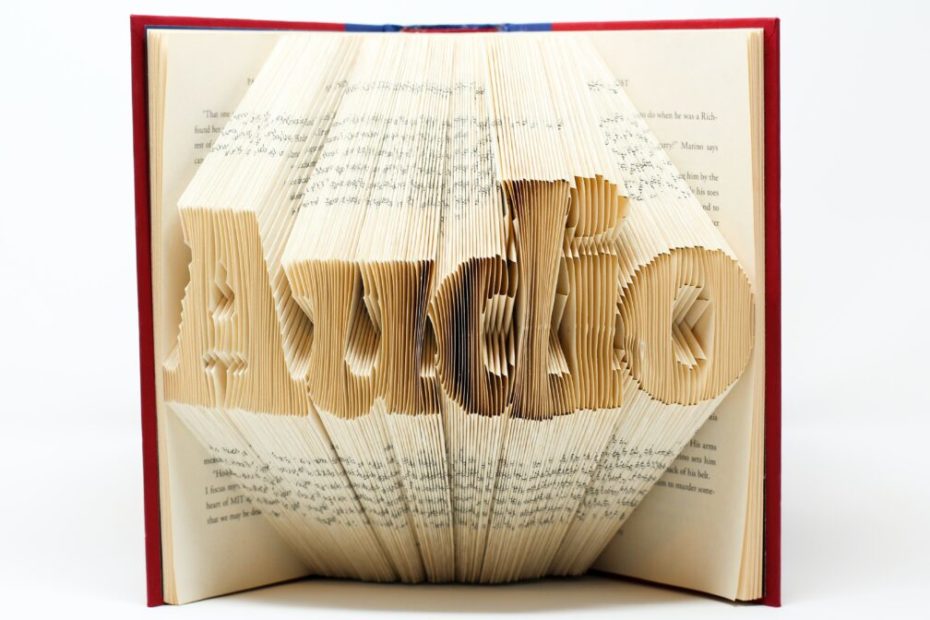We’ve all experienced something that made us fall in love with books. For us, it was my mother playing books on tape in our old Honda Passport. Anytime there was a vacation or miles of road to cover, my mother would rent a couple books from the library, and we would listen to the tapes one after another to pass the hours. When the technology for listening to audiobooks changed, my mom was fast to adapt to online libraries so that she could have an audiobook downloaded at all times. When we learned to drive, we carried on the tradition for myself. we still find myself sitting in my car outside the house, entranced by the narrator, waiting for a good stopping point, but hoping that it wouldn’t come too soon. If it weren’t for audiobooks, we don’t believe we would have the appreciation for books that we have now. 
For us, audiobooks preceded books in my journey toward literacy. It was through audiobooks that we came to realize the necessity of the book as a format to collect writing. With their help, we recognized books as a way to tell a story, and transmit big ideas which may not be expressed any other way. When we fall out of the habit of reading, we come to audiobooks to return us to what we love. In this regard, every audiobook we have listened to has been “worth it” to us.
For authors who can’t decide if making an audiobook is “worth” the time and money required to make an audiobook, here are a few things to consider.
- Practicality – Are you in a position to make an audiobook?
- Genre – Will your book transfer well to an audiobook format?
- Audience – Will your audiobook reach its intended audience?
 Let’s start by recognizing that for writers and readers, worth does not equal cost. We can’t tell you whether or not making an audiobook will be worth your time and money. Our relationship with audiobooks is that of a consumer and observer. Not as a producer. However, within just a few hours of research we found that the process is not nearly as hard as one might imagine. We have believed that audiobooks were for award winning writers with big time publishers, major distributing contracts, and a philanthropic celebrity contact to narrate the piece for free. We had never pictured a process that was easy; let alone one that would be accessible to any author with a computer and something to be recorded. Essentially, this is all you need. While the process itself has become streamlined, it may not be useful for all authors.
Let’s start by recognizing that for writers and readers, worth does not equal cost. We can’t tell you whether or not making an audiobook will be worth your time and money. Our relationship with audiobooks is that of a consumer and observer. Not as a producer. However, within just a few hours of research we found that the process is not nearly as hard as one might imagine. We have believed that audiobooks were for award winning writers with big time publishers, major distributing contracts, and a philanthropic celebrity contact to narrate the piece for free. We had never pictured a process that was easy; let alone one that would be accessible to any author with a computer and something to be recorded. Essentially, this is all you need. While the process itself has become streamlined, it may not be useful for all authors.
The process of making an audiobook is a deliberate endeavor. It will demand attention and resources. Recognize that audiobook production is not a necessity and that there are some bases to cover before you even start to think about going forward with the process. Let’s get this straight. The goal of the audiobook is to make writing more accessible to listeners. If this isn’t your goal, you won’t find success with audiobooks. Think practically about audiobooks so you know if it’s a good thing for you to do. Here are a couple things you might ask yourself for practicality’s sake. Do you have a readership who is already interested in your work? If so, try to get to know them better and determine if audiobooks are something they want. You’re also going to need money for this project. If your resources are stretched thin, then don’t take on more than is necessary. Remember that audiobooks should come secondary to publication itself. Therefore, if your writing is still in the workshop, close this tab and get back to finalizing your drafts.
 Genre also plays a big role in helping you make the decision to record or not. Not all books will be good audio files. We don’t know anyone who would spend their time listening to a recording of a cookbook, travel guide, or anything which is heavily dependent on pictures. If you know your audience will need a hardcopy book in front of them to enjoy your work don’t do them (and yourself) the disservice of offering an audiobook format. That being said, books with a strong narrative and descriptive prose make some of the best audiobooks. Once you’ve recognized your genre, take a look at your audience.
Genre also plays a big role in helping you make the decision to record or not. Not all books will be good audio files. We don’t know anyone who would spend their time listening to a recording of a cookbook, travel guide, or anything which is heavily dependent on pictures. If you know your audience will need a hardcopy book in front of them to enjoy your work don’t do them (and yourself) the disservice of offering an audiobook format. That being said, books with a strong narrative and descriptive prose make some of the best audiobooks. Once you’ve recognized your genre, take a look at your audience.
All writers want to be read. Audiobooks are great because they can increase the number of people who consume your work. They also give you a chance to make some extra money. In a study by The Panorama Project it was found that 70% of audiobook listeners multitask while they listen. Recognize that over two thirds of your listening audience will do so with something else in their hands. In addition, audiobooks have grown in popularity with young people, people of color, and folks who make higher than average incomes. It’s also a popular format for people who read lots of books in a year and people who are unable to read books in the traditional fashion. If your books are geared towards audiences like these then you may be wise to pursue audiobook production. However, If you’ve not identified an audience for your book, then there may be none for your audiobook.
If you still like the idea of giving your words a voice, a professionally produced recording can be done entirely online with the help of an audiobook recording service. Companies like ACX will handle the recording and distribution work, while leaving you (the writer) in command as the main rightsholder of your book. Once you make a distribution agreement with the recording company and decide on a wage for your narrator then you’ll be on your way to putting your writing into a highly distributable medium. If you would like more information on the process of making the audiobook itself, this article from Written Word Media may be a good source to check out.
 The landscape in which people consume writing is changing fast these days. We know that people still read books, but libraries and bookstores are not the literary spaces that they once were. The paperback novels, newspapers, and magazines are in a fight for viewership, and the competition is steep. Writing of all kinds now finds its place on blogs, electronic publications, video, and podcasts. These are just a few of the ways we are able to keep a literary conversation going in a meaningful and deliberate way. Audiobooks are another means to this end. Contribution to this discussion is the essence of writing, and if that can be achieved through audiobooks then the literary tradition moves forward. Progress is always worth the work, but it’s for the author to decide how to go forward.
The landscape in which people consume writing is changing fast these days. We know that people still read books, but libraries and bookstores are not the literary spaces that they once were. The paperback novels, newspapers, and magazines are in a fight for viewership, and the competition is steep. Writing of all kinds now finds its place on blogs, electronic publications, video, and podcasts. These are just a few of the ways we are able to keep a literary conversation going in a meaningful and deliberate way. Audiobooks are another means to this end. Contribution to this discussion is the essence of writing, and if that can be achieved through audiobooks then the literary tradition moves forward. Progress is always worth the work, but it’s for the author to decide how to go forward.
